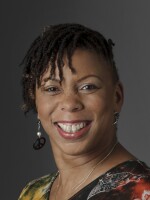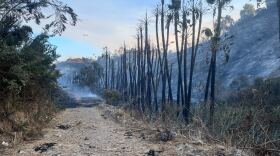When Arlington National Cemetery opened Sunday morning, there was already a line of people outside and a steady stream of people continued to arrive to visit Sen. Edward Kennedy's final resting place.
"It's like we're a part of history," says Sherry Adams, who was visiting with two co-workers in town from Dickerson, N.C., for a public health conference. Adams had already visited the eternal flame at the grave of Kennedy's brother, President John F. Kennedy, but said being at the cemetery Sunday was important to her.
Kennedy died Tuesday after a yearlong battle with brain cancer and was buried Saturday near his brothers, John and Robert, who were assassinated four decades ago.
"I was in kindergarten when John F. Kennedy got assassinated, so that's always been part of my historical background," Adams says. "The whole family history has always been something I think we all have been raised with."
"This family is really good for this country," says Zahree Rastagar, who arrived with her husband on a tandem bicycle. Rastagar, who is from Iran, says she admires the late senator's work on immigration and has followed the family's triumphs and tragedies.
She says she cried watching the news coverage of the senator's death.
Those same feelings of sorrow and admiration run like a thread through the mourners, regardless of age, race or nationality.
"People are very solemn; they're very quiet," says tour guide Lou Ann Filadelfo of the line of people waiting to visit the gravesite. "They're approaching the grave very reverently. ... Some it looks like they're saying a prayer."
Filadelfo says she had to come pay homage to a man she respected very much. She says Kennedy always came to meet with her tour groups from his home state of Massachusetts.
"I had met Sen. Kennedy many times and I found him to be a very warm, interested person," she says. "And I was very sad to see that he had died.
"He did so many incredible things for the state of Massachusetts and for our country," says Stephanie Bettinelli, whose family came to D.C. from Chelmsford, Mass., on Thursday and spent three hours standing outside the U.S. Capitol to see the senator's funeral procession Saturday. She says she admires his civil rights work and wanted her sons — ages 1, 8 and 12 — to learn about a man she believes was important.
"I want them just to see and hear who he was and all the amazing things he did and what he fought for," she says, "and hopefully what will continue to happen as a result of what he's done.
The senator's grave is covered with grass and marked with a wooden cross and a marble foot marker. Cemetery officials say in the future, something more substantial probably will be built.
Copyright 2022 NPR. To see more, visit https://www.npr.org. 9(MDAzMjM2NDYzMDEyMzc1Njk5NjAxNzY3OQ001))







